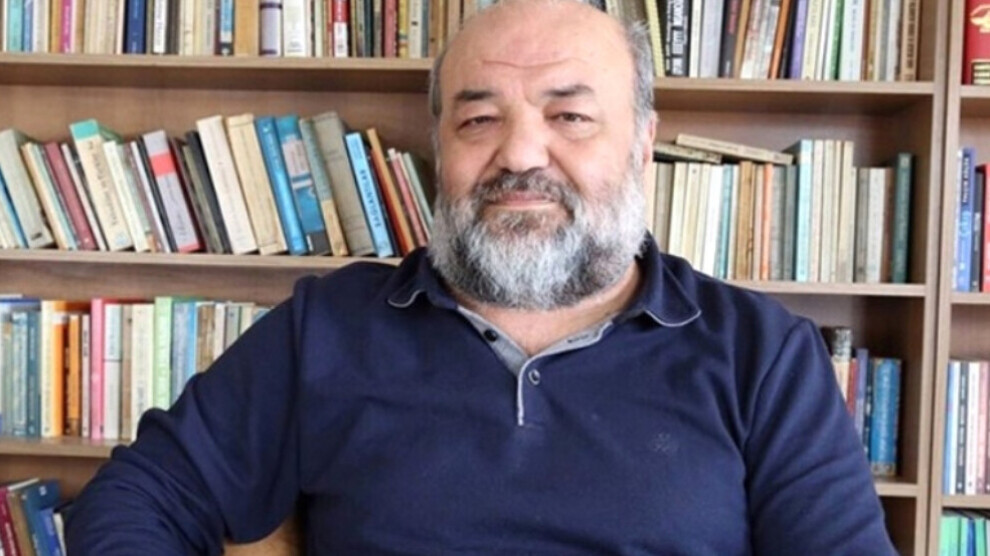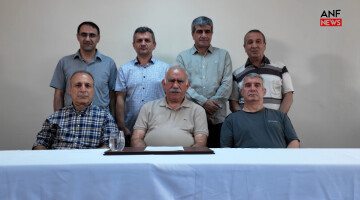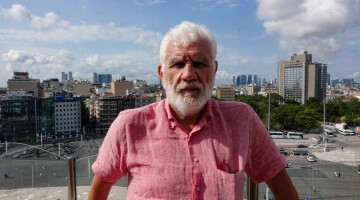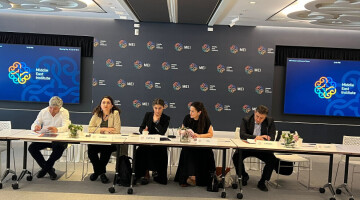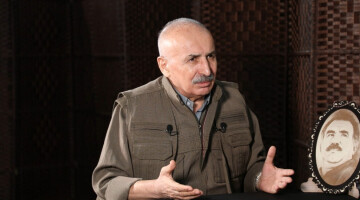In an interview with ANF, theologian and writer Ihsan Eliaçık commented on the political discourse with which the AKP is trying to hold on to power. He sees the AKP's repression and clinging to power as rooted in the fear of one day having to account for the crimes it has committed.
Tayyip Erdoğan insulting a woman wearing a headscarf alongside CHP Chairman Kemal Kılıçdaroğlu as a "mannequin," reigniting the headscarf debate. How do you view the AKP's constant reopening of this debate?
Erdoğan has been doing this for a long time, and if we look back, we can see that religious issues occupy a large place in Turkey’s political life. For example, Adnan Menderes came to power by declaring that he would translate the call to prayer back into Arabic, that is, return to the original. For 18 years, the call to prayer had been in Turkish. Erdoğan came to power by saying he would allow the headscarf everywhere. That was his most important promise. Many people in Turkey were affected by the headscarf issue. That gave the AKP a tailwind. That's why the headscarf is the main issue for AKP politicians. Today, when they see a woman wearing a headscarf next to CHP Chairman Kılıçdaroğlu, they act as if their toys have been taken away. They demand their toys back and do not even shy away from insulting the woman with a headscarf as a "mannequin”.
So this problem exists, but it is certainly not Turkey's main problem. Yes, there is a social rejoinder to this as well, but the real problem lies elsewhere. The problem is that the budget negotiations were concluded and the daily expenses of the palace were set at eleven million TL (Turkish Lira). At the same time, the minimum wage was recently set at 2,825 liras [about 311 euros]. So the palace is gobbling up 3,970 minimum monthly wages a day. That is the real, permanent problem. To cover it up, they want to steer the political discussion into areas they know well. That's why they bring up the religion discussion so often, and the headscarf is one of the most fundamental points in that regard.
As you said, issues with religious connotations come up frequently. The takeover of Hagia Sophia, for example, was accompanied by a conglomeration of national and religious sentiments. What do these developments point to?
It shows that the AKP is successful on these issues and at least preserves its voices when it raises these issues. The Hagia Sophia controversy is also such an example. Actually, what should have been done was not done.
What do you think should have been done?
If you think not politically but in terms of truth and justice, then Hagia Sophia should have been converted into a church because we don't need such a mosque. We don't need another church converted into a mosque. This is an issue that was closed 500 years ago. We are the ones who are making history now, there are already 50 to 60 mosques around Hagia Sophia. The Sultan Ahmet Mosque is right across the street. That could have been a symbol of pluralism and tolerance for the whole world. The AKP wanted to send a different message by provoking religious and national feelings and making identity politics. It even showed a sword. A look at the polls shows that it did nothing. A historic institution has been sacrificed to an unrealistic and fraudulent religious identity politics for nothing.
One of Erdoğan's greatest abilities is to blame the other side for what he himself has done. He himself brings elitism to perfection but accuses the other side of it. He perfects injustice but accuses the other side of injustice. He always portrays himself as a victim, but he has long become an elitist power monger and palace lord. AKP supporters still allow themselves to be portrayed as the outcast faithful victims in Turkey. And they intend to never give up that definition. Erdoğan still portrays himself as a victim, even though he lives in luxury and pomp in the palace, his foot never touches the asphalt and never leaves the red carpet. The CHP supporters, the people of Beşiktas, Kadiköy and Boğaziçi, are elitist to them.
The AKP politicians portray themselves as the voice of the victims who have come to Kasımpaşa from Anatolia with hunched shoulders and roam the streets with a rural attitude. This is the identity Erdoğan has been building for years, but a lot of water has flowed down the stream since then. The first two legislatures can perhaps still be considered within this identity, but it is different now. AKP politicians talk about elitism, but what is elitism? It is elitism not to recognize elections. It is elitism to live in a palace separated from the people or to appoint an official as a trustee. They also don't know the students at Boğaziçi University. Seventy percent of those students are from Anatolia. They are children from Anatolia or the children of families from Anatolia who migrated to Istanbul. It is not the children of the upper class who study there.
Repression by the AKP regime has increased massively. How does that fit in with the victim discourse?
Generally, when regimes come to the end of their power, they increase repression. They resist stepping down. Even if the president retires under these circumstances, he could live an elite, luxurious life. But the main reason is that government politicians are involved in crimes, both national and international, from money smuggling to massacres and murders. They have become perpetrators or suspects of many crimes. During their time in power, there have been many massacres and unsolved murders. It is known who committed these crimes, but nothing is done. At the same time, the country has been rocked by corruption scandals, but again, nothing concrete has been done. They know very well that these files will be reopened after they leave power, both internationally and domestically. The gamut of crimes, as I said, ranges from money smuggling to war crimes. It is their fear that the rest of their lives will not go so well that drives them to cling to power at all costs. This fear deprives them of sleep, so they do not stop using all possible forms of repression to avoid losing power.

